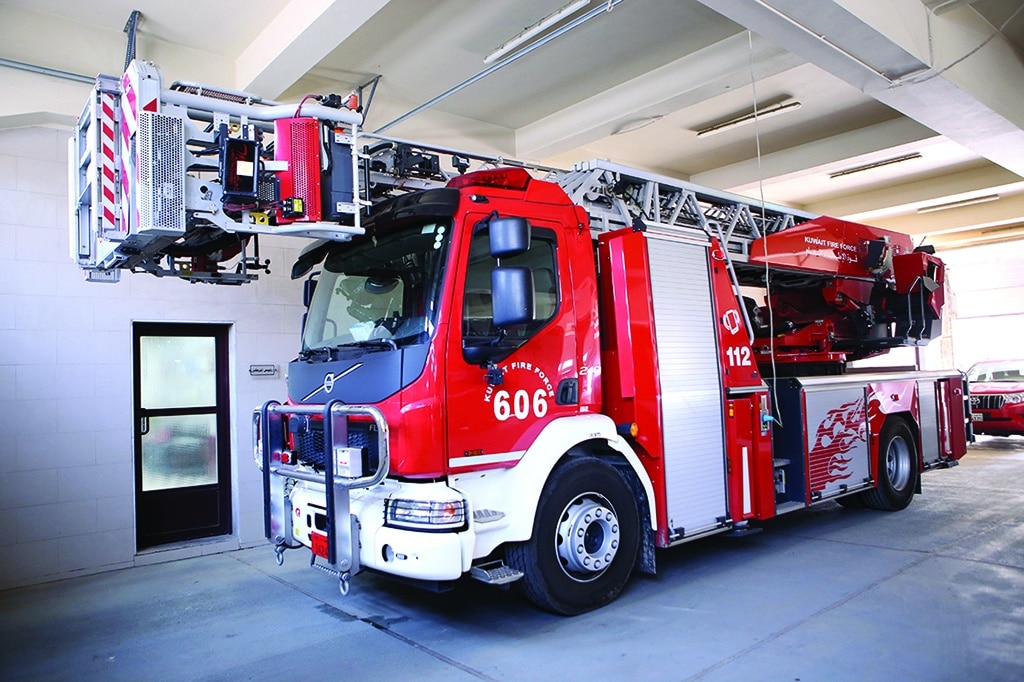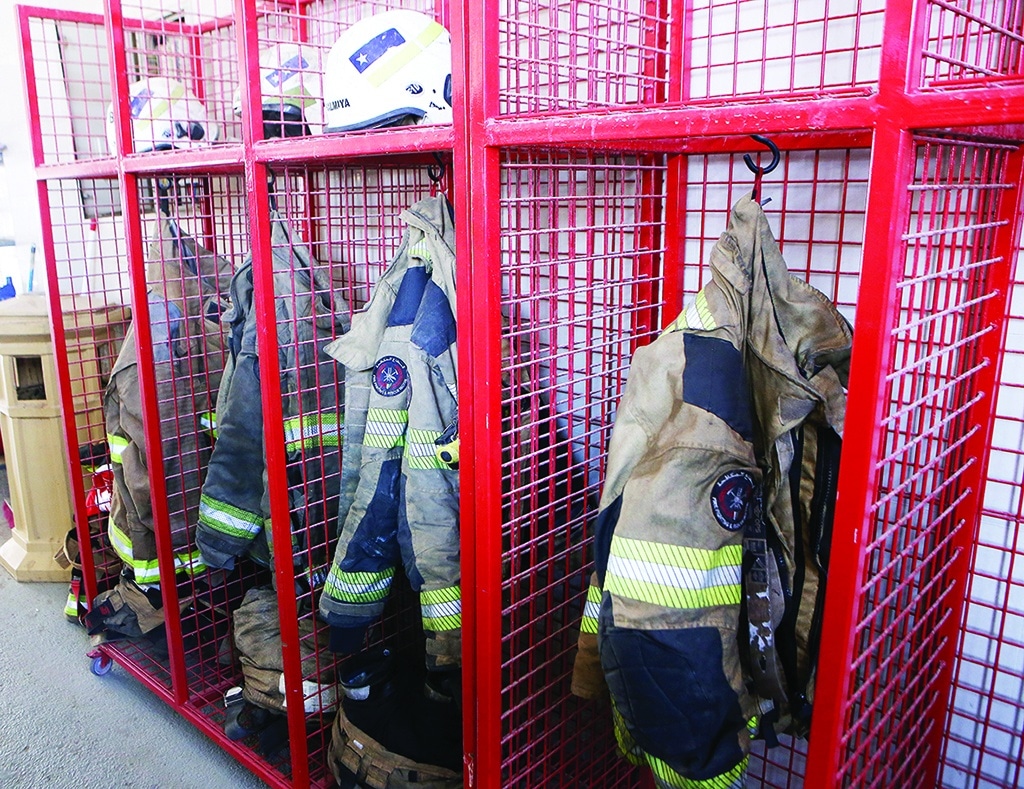By Nawara Fattahova
KUWAIT: Firefighting is one of the most difficult and dangerous professions. Head of the Salmiya Fire Station Col Mohammed Abdulkhudhur said: "Every day when I leave my house and come to work, I don't know if I will return home alive. Our work is hard, but I feel very satisfied when I save a life". The firefighters don't have regular working hours. "There are two work shifts depending on the fire station where the fireman works.
At urban centers, firemen work for 24 hours followed by 48 hours off. Work begins at 8:00 am, till 8:00 am the next day. In far-flung areas near the borders (both northern and southern), firemen work for 48 hours, followed by four days off. After returning from a blaze to the station, they have to refill their vehicles with foam, water and oxygen cylinders to be ready for the next call," Abdulkhudhur told Kuwait Times.
The number of fires increase during the summer season. "This increase is not only caused by the hot weather, but also because of the summer holidays of children, who are at home most of the time. Sometimes they like to play with dangerous objects and imitate adults. So, they play with lighters and cause fires," he added.
 Head of the Salmiya Fire Station Col Mohammed Abdulkhudhur
Head of the Salmiya Fire Station Col Mohammed Abdulkhudhur"Our work depends on the calls that we receive. Every day is different. Sometimes our station receives only one call, sometimes two, and sometimes the number may reach eight or more. Also, the season affects the number of accidents and its type. Every day at 8:00 am, the staff will start their duty. This includes checking the vehicles and their equipment to see if any needs to be fixed or replaced," Abdulkhudhur said.
The call starts from the emergency line 112. "If the call is related to the fire department, the call center will transfer it to us. The operator will get all the possible information including the address, type of fire, and other details. It's very important to include information such as landmarks near the accident location, which will help firefighters to reach the place faster. Based on that, we send the proper vehicle, as we have two teams - a rescue team and a fire team, and each of them have their role," he pointed out.
Kuwait Fire Service Directorate is following a strategy. "When we receive a call about a fire in a building, school, house or university, two centers will always head to the site. There should be 10 to 12 firefighting vehicles at the place, with between 45 and 50 firefighters. The officer in each of these vehicles gives instructions to the firefighters on the way to the site of the fire," stressed Abdulkhudhur.
Firefighters deal with different kind of accidents, and not only fires. "We deal with all kinds of fires in buildings, containers, cars, trees, camps and others. We also deal with road accidents when there are people stuck inside cars, to release them after cutting the vehicle with special equipment. After getting them out, medical emergency personnel will take care of them," he said.
"We also deal with elevator accidents, when people get stuck due to power cuts or poor maintenance. We also receive calls to rescue children who have locked the door from inside and are stuck. In these cases, we break the door, but now we have a special tool to unlock the doors, which causes less damage. We also deal with suicide cases. Cutting rings stuck in people's fingers is also common, as well as extracting workers' hands from meat mincers. We also help policemen by cutting handcuffs whose keys they have lost," noted Abdulkhudhur.
"We also deal with cases of rescuing animals including cats, snakes and even bees, but this responsibility is now transferred to the Public Authority for Agricultural Affairs and Fish Resources. We also remove trees fallen on the road, as well as rescue people during floods. As part of our work, we also clean streets if an oil leak occurs to prevent accidents," he told Kuwait Times.
"During every shift, there should be a head of department, officers, firefighters and vehicle operators in each center. If we have more staff, our work will be quicker. In some fires, we stay for around five hours to extinguish it, while for others we stay even longer. All staff have passed training courses inside Kuwait and abroad. In addition to the firemen, there is a hazmat team to deal with hazardous materials. Every material has its own code, and the team is updated on this issue," highlighted Abdulkhudhur.
The most dangerous and difficult events for firefighters are fires in large building such as warehouses, where there is a possibility of roof collapse. "It makes it more difficult for us if the owner of the burning warehouse or building doesn't tell us about all the materials inside this building. If we know the contents of the building, we can choose the best way of firefighting. In some fires we use water, while in others foam. Our modern vehicles now contain a mix of extinguisher including water, foam and air. This technique is easier for us to use and safer for the affected area," he added.
Salmiya fire station is one of the oldest stations in Kuwait, built in the 1950s. There are over 50 fire stations now, and the number is always increasing depending on new areas being built. "Some stations are being equipped while some are still in the building process. We have top, international-standard fire stations - the Souq Mubarakiya blaze is evidence of this, as we succeeded in dousing the blaze within 12 hours, although it's an old market full of flammable materials and buildings close to each other," Abdulkhudhur said.
Electricity is also one of the main causes of fires. "Not only do increased load and consumption of electricity cause fires, but also using low-quality extensions is behind many cases of fires. People plug large appliances that consume a lot of power like a TV, receiver, washing machine, refrigerator and microwave in one extension, and when it gets old, the insulation will melt and the wires will come in contact, resulting in ignition and fire," explained Abdulkhudhur.
The number of fires is not geographically proportional, but based on the population, urbanization and the type of houses in a certain area. "For instance, Salmiya is a crowded area with huge population density, high buildings and a large number of businesses including medical centers, schools, clubs, institutions, nurseries and others. Also, the culture of the residents of each area affects the possibility of fire," he pointed out.
Abdulkhudhur has some advice for people. "People should install fire detectors in their homes. They should also have fire extinguishers, fire blankets and gas detectors installed in the kitchen. Also, parents should never lock the doors and leave their children inside when they go to work. In case of emergency, this can be very dangerous. Once two kids died inside a flat during a fire before we could bring them out. I also call upon people to call the emergency hotline to report an accident rather than shoot videos of the incident. Drivers should clear the road for us in emergency cases when they hear our sirens," he said.
Maj Ali Mohammed Hasan from the public relations department of Kuwait Fire Force said the directorate is always holding awareness campaigns in cooperation with both the public and private sectors. "We try to raise awareness amongst the community, so people will be ready to act properly in case of an emergency, before the arrival of firefighters. Safety measures are important in buildings to minimize damage. Our problem is with private homes, as there is no law to force people to install fire detectors in the house, so we advise them to install them," he stressed.














